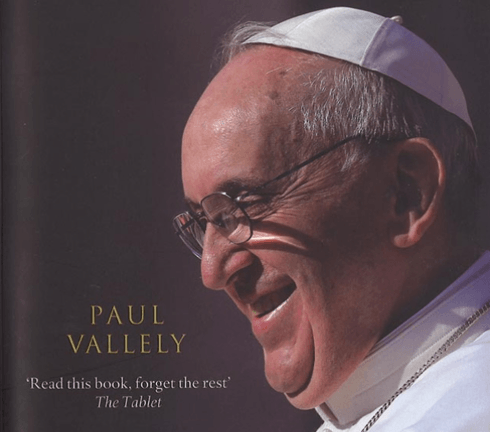Oprah Winfrey at the premiere of her Greenleaf drama; centred around a black churchgoing family - Credit: Van Tine Dennis/ABACA USA/PA Images.
Pope Francis: Untying the Knots – The Struggle for the Soul of Catholicism
Pope Francis has certainly made his mark in the almost five years since his election. From kissing disfigured people and issuing (fairly) radical edicts about climate change, poverty and judgmentalism to being sent a dubia1 – a list of questions of clarification relating to his papal teachings – by four cardinals, he’s pushed some boundaries in the Catholic church. Widely acclaimed as (by which I mean lots and lots of my Catholic friends say) the most authoritative and compelling biography of his life, Paul Vallely describes the mood music and the internal politics which define this Pope’s achievements and controversies to date. This review notes the author’s concern about the Pope’s apparent slowness to tackle the horrific child abuse crisis. Given Vallely’s own diligence in reporting carefully the ramifications of the global abuse scandal and his continued calls for the Pope to face this challenge, it’s hardly surprising that this biography doesn’t let the Pope off the hook. It scrutinises as much as celebrates, and names some uncomfortable truths in the Catholic church.

Der Spiegel on the Middle East’s humanitarian crisis
Perhaps because there has been a Yazidi community in Germany since the 1990s, when conflict and religious persecution caused mass displacement from Iraq and the surrounding region, Der Spiegel has consistently provided high-quality coverage since the summer of 2014 about the effect of Da’esh on religious communities.
In this piece on the recent order by the Iraqi Prime Minister to invade IS hometown Tal Afar, we learn about the demise of the IS ‘caliphate’ and the downfall of its leadership – between 80% and 90% of whom are now dead. I went to northern Iraq in August 2014 to interview people as they fled Mosul and Mt Sinjar, and very much recognise these stories of vandalised places of worship, forced conversion and brutal attacks. A priest, who returns to Qaraqosh to find Viagra and underwear in his former bedroom and concludes that women were raped there, asks
“Should the city be burned down before it is rebuilt, to get rid of the pain? Or would it be better to turn it into a museum?”
My Family, Partition and Me: India 1947
From the BBC – With Episodes One and Two available on the iPlayer for UK residents who pay a licence fee.
Fascinating and deeply moving account of four British people who retrace their grandparents’ steps by visiting the sites in India where their families had experienced the consequences of violence during Partition in 1947. Religion is very present – it’s the cultural identifier of three of the four – with places of worship, forms of greeting and the administering of blessings very naturally incorporated into the conversations. I was struck by how many surprises people uncovered. These are all people who are closely connected with their families, and yet important parts of their history had not been shared with them by their grandparents. One man retraces his grandfather’s long and difficult train journey towards refuge and learns that his grandfather’s sister died on a station platform. Awoman meets a childhood friend of her grandfather and learns of their painful secret journey through the night to find freedom. When one woman finds out about the attack on her grandfather’s community by people bearing axes during which women (probably including her grandfather’s wife) were abducted and raped, she is distraught and asks the elderly man who has told her the news for a blessing. His embrace and prayer over her is a powerful moment of grief. The decisions of the grandparents to leave some memories behind while passing on others have shaped the religious and cultural heritage of their descendants.
Australia: same-sex marriage vs religious freedom?
The debate about marriage legislation in Australia is pitched by some people as an argument about religious freedom. Commentators and campaigners draw on precedents set by countries which have already legalised same-sex marriage, and this piece argues that it will be difficult to arbitrate on conflicting freedoms without a bill of rights which names freedom of religion and belief, in line with international agreements. This argument takes the notion of precedent in a different direction, arguing that if bakers were allowed to refuse to bake for a wedding between two people of the same sex, then potentially businesses could also refuse to supply goods and services for weddings between people who have been divorced or interfaith marriages.
Data cited here shows unmistakeable increase in support between 2005 and 2015 for same-sex couples to have the same rights as different-sex couples, and notes that 77% of ‘not religious’ people support equal rights for same-sex couples while only 47% of religious people do. It’s not clear from the article what ‘not religious’ means: in some surveys this might refer to people who do not identify as belonging to any religion while in others it might indicate levels of practice – attendance at religious services, for example. Either way, if almost half of religious people support equal rights for same-sex couples (which is not, of course, the exact question that a proposed plebiscite about same-sex marriage would be asking) this does not demonstrate universal opposition from people of faith.







Join the discussion
Join like minded readers that support our journalism by becoming a paid subscriber
To join the discussion in the comments, become a paid subscriber.
Join like minded readers that support our journalism, read unlimited articles and enjoy other subscriber-only benefits.
Subscribe